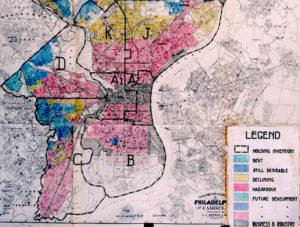Why you should hire an agent who understands fair housing
There is literally a $100,000 difference in sales price when you cross 6th Avenue.
- 4 min read
- January 20, 2020
There is literally a $100,000 difference in sales price when you cross 6th Avenue.

In Tacoma, you literally see a $100,000 difference in sales price when you cross 6th Avenue. As in, the exact same house would sell for $100,000 more or $100,000 less, depending on whether it is north or south of that street. This is no accident. Nor is it a coincidence that residents in Old Town or Proctor live on average 25 years longer than people who live around the Tacoma Mall, for example.

The reason is simple. Real estate in America is incredibly racialized, and is essentially a hierarchy of winners and losers based on generations of unearned privilege (or the lack thereof). 98% of all land in the United States is owned by white people, 87% of real estate agents are white, and up until the 1970’s, the federal government and lenders would deliberately not loan to black borrowers or even to people seeking to live in neighborhoods with black people in it. Even in places like the ostensibly liberal Pacific Northwest, discriminatory private covenants prevented non-whites from owning houses in certain neighborhoods, and those covenants still remain on the books today, even if their legal power is unenforceable.
In other words, this lopsided distribution of real estate ownership and power across racial lines didn’t just happen. It was made to happen, by centuries of subjugation and continued discriminatory practices.
 Even today, non-white borrowers often receive significantly different treatment than white home buyers from mortgage lenders, real estate agents, and of course home sellers in the market place. For example, just recently a three year investigation into Manhattan real estate agents found that half of black real estate clients received adverse treatment compared to their white counterparts. Discrimination and inequity is not history – it is our present reality. And it is our responsibility to own it and confront it head-on.
Even today, non-white borrowers often receive significantly different treatment than white home buyers from mortgage lenders, real estate agents, and of course home sellers in the market place. For example, just recently a three year investigation into Manhattan real estate agents found that half of black real estate clients received adverse treatment compared to their white counterparts. Discrimination and inequity is not history – it is our present reality. And it is our responsibility to own it and confront it head-on.
So how does this affect you, as a prospective home seller or home buyer down the road?

For starters, real estate clients like you have a part to play in reversing discrimination. Don’t ask questions like “So is this a good neighborhood?”, or “How are the schools around here?” and don’t talk about the kinds of people you want to sell the house to, for instance. If you ask these questions, a trustworthy real estate agent will educate you on why asking them isn’t in your best interests and will provide you with objective information, like the Tacoma crime map or the school district website. Untrustworthy agents will pander to you, or worse. Be attentive.
 Besides the moral obligation of examining our own biases, you should think of fair housing in terms of your own self-interest as well. For example, working with responsible actors in the real estate community means a greater chance of closing the transaction once you’re under contract, as some agents have reported that having a discriminatory other party was a major factor in the house failing to sell.
Besides the moral obligation of examining our own biases, you should think of fair housing in terms of your own self-interest as well. For example, working with responsible actors in the real estate community means a greater chance of closing the transaction once you’re under contract, as some agents have reported that having a discriminatory other party was a major factor in the house failing to sell.

As a buyer, you deserve certainty and peace of mind that your Realtor® understands fair housing rules front to back, and fights to ensure that you receive the fairest treatment possible under the law. As a seller, being represented by a fair housing expert not only means avoiding legal pitfalls with how your property is marketed, but achieving even greater exposure of your property to the maximum number of qualified buyers – which will enhance your chances of selling.
The housing market can be an intimidating journey. Don’t you deserve an informed advocate who will fight to get you the treatment and outcome you deserve, while advancing better values that the real estate industry desperately needs?